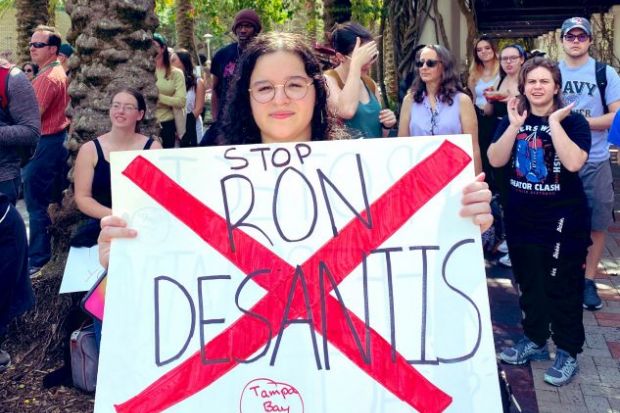Florida lawmakers will consider a measure in their upcoming annual session that would largely codify assaults by the governor, Ron DeSantis, against faculty governance, tenure and the teaching or pursuit of racial equity.
The pending bill threatens to consolidate months of escalating attacks by Mr DeSantis against Florida’s system of higher education, creating what faculty and experts see as a make-or-break moment for the state’s university leaders to show the courage to fight back.
“The problem is, and we’ve seen it repeatedly, is that very few people want to stand in the way of the governor,” said Daniel Smith, a professor of political science at the University of Florida.
The bill, numbered HB 999 in the state’s House of Representatives, would give institutional boards of trustees – whose members are appointed by the governor – a direct role in hiring academic staff, and the right to subject the continued employment of any faculty member to post-tenure review at any time.
The measure also would set a framework for the state government to prescribe new general education courses; ban critical race theory and gender studies as academic majors or minors; bar public institutions from permitting any activities that “espouse diversity, equity and inclusion or critical race theory rhetoric”; and prohibit spending on any diversity, equity and inclusion activities.
Mr DeSantis, ranked as a leading contender for the US presidency in 2024, has been pushing the limits of his executive power in a campaign aimed at demonstrating to conservative voters that he regards education as a fount of politically liberal ideas in American society that must be confronted.
The governor has suffered some setbacks, notably in 2021, when courts blocked his bid to prevent Professor Smith and two colleagues at the University of Florida from serving as expert witnesses in a voting rights case against the state. But Mr DeSantis has found numerous other avenues, most significantly his power to appoint institutional trustees.
His crowning achievement to date in that arena has been his overhaul of the New College of Florida, a progressive public liberal arts college that is now led by a conservative-dominated board of trustees that summarily evicted its president.
HB 999 was proposed by representative Alex Andrade, a two-time University of Florida graduate who is part of an overwhelming Republican majority in both chambers of the state legislature. Political experts acknowledged uncertainty about the degree to which the Andrade initiative reflected real intent on the part of Republicans for the two-month legislative session that begins early next month, as opposed to mere partisan posturing for a segment of voters.
Experience, however, suggests that there is reason to be concerned, said Cecile Scoon, the statewide president for the League of Women Voters, a nominally non-partisan advocacy group concerned with defending democratic ideals. “There have been many things that I think the league and other voting rights organisation never thought would get passed,” Ms Scoon said.
Part of the difficulty in assessing Mr DeSantis’ ultimate intent, she said, was the speed at which change has been happening. “I honestly believe people are still taken aback,” Ms Scoon said, referring to the state’s voters. “Even though these things are occurring in rapid succession, they've never been seen in Florida.”
That creates a moment, Professor Smith said, in which Florida’s university leaders finally must start speaking out publicly, to warn Floridians – especially students and their families – about the dire threat being posed to their public system of higher education. Public college and university presidents have consistently kept silent, out of fear, even while Mr DeSantis decapitated New College, he said.
“I think the idea is that if you just keep your head down, this will all pass, or it will at least pass my institution,” Professor Smith said, describing the apparent mindset among institutional leaders. “And we see quite clearly that House Bill 999 is going after the whole state college system.”
Register to continue
Why register?
- Registration is free and only takes a moment
- Once registered, you can read 3 articles a month
- Sign up for our newsletter
Subscribe
Or subscribe for unlimited access to:
- Unlimited access to news, views, insights & reviews
- Digital editions
- Digital access to THE’s university and college rankings analysis
Already registered or a current subscriber?




